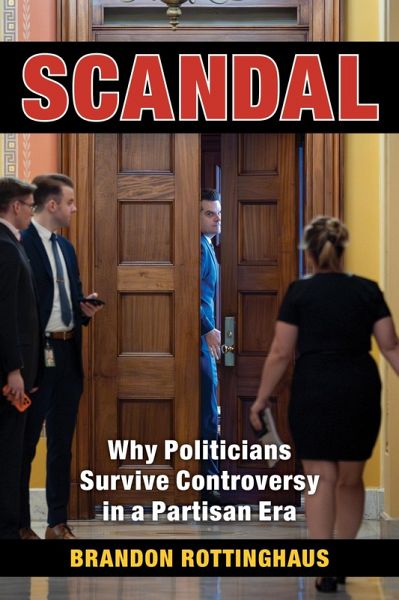
Scandal (eBook, ePUB)
Why Politicians Survive Controversy in a Partisan Era
Erscheint vor. 25.11.25
20,95 €
inkl. MwSt.
Unser Service für Vorbesteller - dein Vorteil ohne Risiko:
Sollten wir den Preis dieses Artikels vor dem Erscheinungsdatum senken, werden wir dir den Artikel bei der Auslieferung automatisch zum günstigeren Preis berechnen.
Weitere Ausgaben:

PAYBACK Punkte
10 °P sammeln!
Once, it was thought, a scandal was the kiss of death for a political career. Today, however, surviving scandal seems to be the norm. Donald Trump has weathered-and even perhaps benefited from-controversies that would have been unimaginable for virtually any other candidate. Prominent figures in both parties have won elections and remained in office despite credible allegations of wrongdoing. Do scandals still matter? When and why do voters punish politicians or give them a free pass?Charting the changes from Watergate to the present, this book is a rigorous and compelling investigation of the...
Once, it was thought, a scandal was the kiss of death for a political career. Today, however, surviving scandal seems to be the norm. Donald Trump has weathered-and even perhaps benefited from-controversies that would have been unimaginable for virtually any other candidate. Prominent figures in both parties have won elections and remained in office despite credible allegations of wrongdoing. Do scandals still matter? When and why do voters punish politicians or give them a free pass?
Charting the changes from Watergate to the present, this book is a rigorous and compelling investigation of the politics of scandals. Bringing together wide-ranging survey data, innovative experiment design, and historical analysis, Brandon Rottinghaus demonstrates how political polarization, affective partisanship, fading trust in media, and the spread of misinformation have diminished the resonance of controversies. Although scandals still fell many politicians, there is a clear trend over time for fewer voters to be swayed by them. In a polarized world, scandals take only a modest toll on politicians' approval ratings, survival in office, ambitions, and legacies. In many cases, partisans accept-or even embrace-misbehavior from members of their own party and revel in scandals affecting the opposing party. Challenging conventional wisdom with extensive data, this book illuminates the declining significance of scandals and the consequences for democratic accountability.
Charting the changes from Watergate to the present, this book is a rigorous and compelling investigation of the politics of scandals. Bringing together wide-ranging survey data, innovative experiment design, and historical analysis, Brandon Rottinghaus demonstrates how political polarization, affective partisanship, fading trust in media, and the spread of misinformation have diminished the resonance of controversies. Although scandals still fell many politicians, there is a clear trend over time for fewer voters to be swayed by them. In a polarized world, scandals take only a modest toll on politicians' approval ratings, survival in office, ambitions, and legacies. In many cases, partisans accept-or even embrace-misbehavior from members of their own party and revel in scandals affecting the opposing party. Challenging conventional wisdom with extensive data, this book illuminates the declining significance of scandals and the consequences for democratic accountability.
Dieser Download kann aus rechtlichen Gründen nur mit Rechnungsadresse in A, D ausgeliefert werden.












